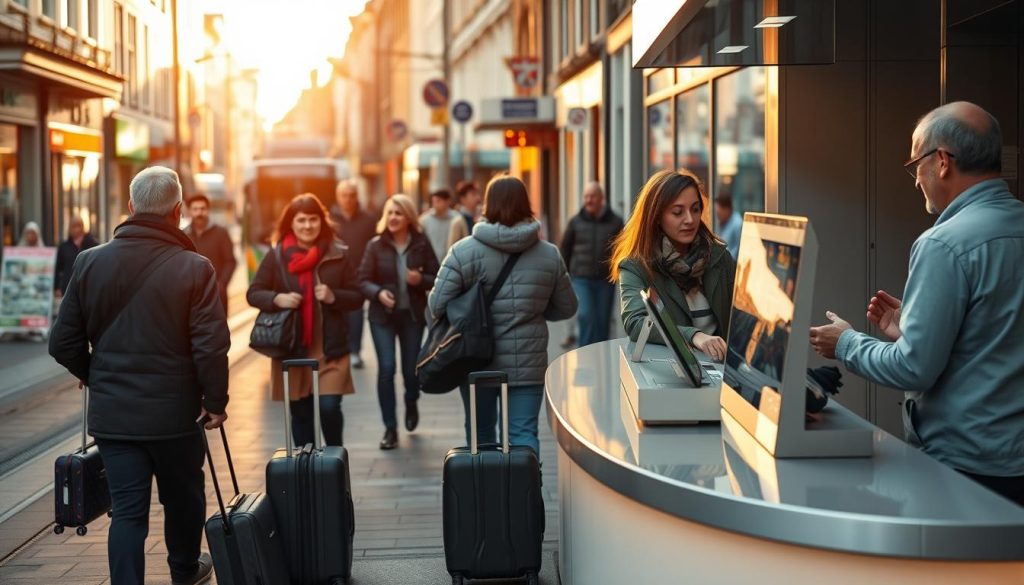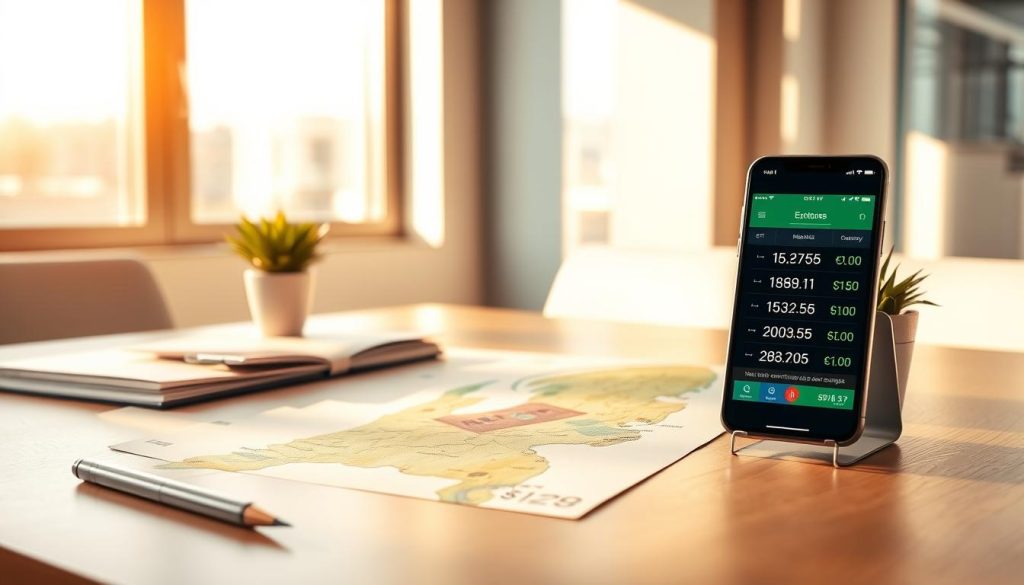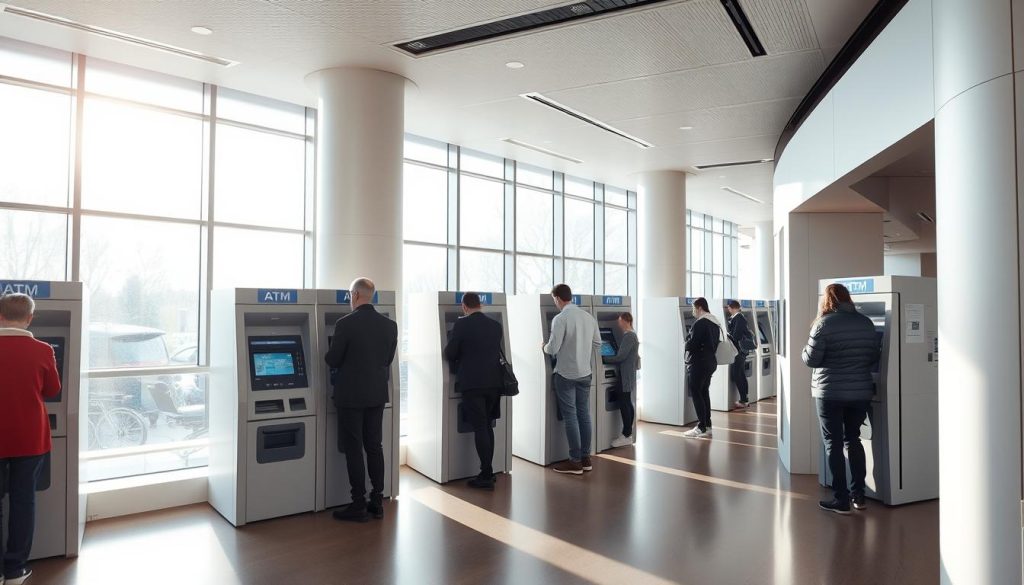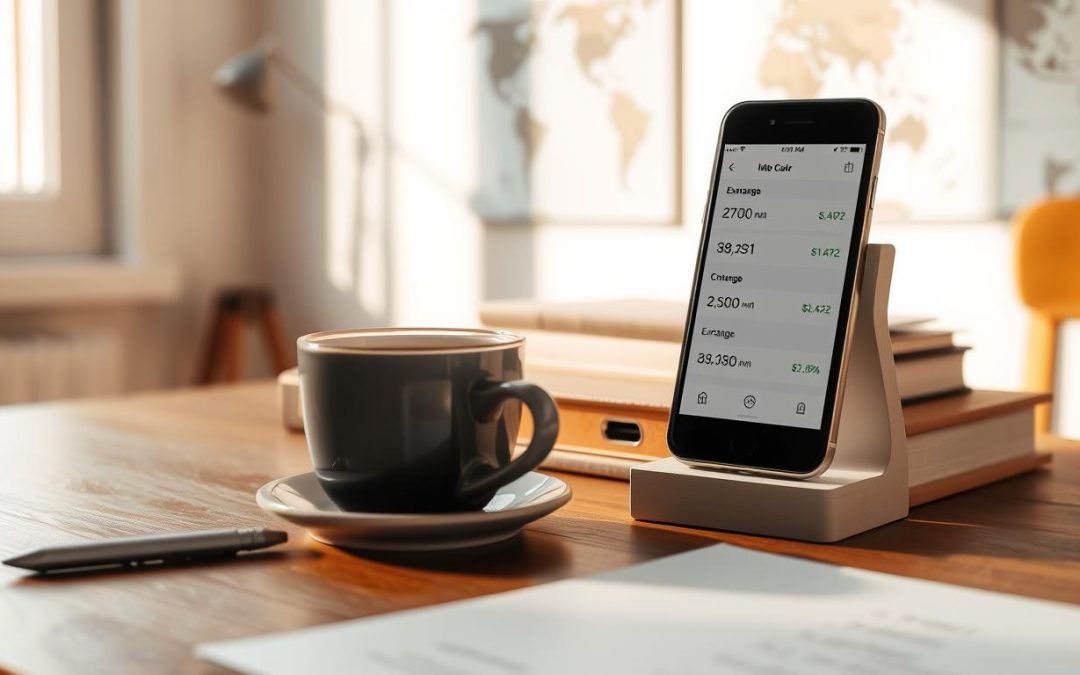Planning a trip abroad is exciting, but managing your money efficiently can be a challenge. Did you know that understanding exchange rates and payment methods can save you both time and cash? Whether you’re exploring bustling cities or quaint towns, having the right financial strategy is key to a stress-free journey.
This guide will help you navigate the essentials of handling money while traveling. From avoiding excessive fees to finding the best rates, we’ve got you covered. With tools like Wise, you can optimize your conversions and make the most of your budget.
Whether you prefer using cards or carrying cash, we’ll break down the most common payment methods. Plus, we’ll share tips to ensure you’re prepared for every transaction. Ready to take control of your travel finances? Let’s dive in!
Key Takeaways
- Know the current exchange rate to get the best value for your money.
- Use reliable tools like Wise for efficient currency conversions.
- Carry smaller banknotes and coins for convenience.
- Check with your bank about international ATM fees before your trip.
- Plan ahead to avoid unnecessary fees and maximize your budget.
Understanding the Currency Landscape in the Netherlands
Navigating the financial landscape of a new country can feel overwhelming, but understanding the basics makes it easier. In the Netherlands, the euro (EUR) is the official currency, and it’s widely accepted across the country. Let’s explore its history and key facts to help you manage your money effectively.
A Brief History: From Guilders to Euros
Before the euro, the Netherlands used the Dutch guilder as its official currency. The transition to the euro took place in 2002, marking a significant shift in the country’s financial system. This change aligned the Netherlands with other European nations in the eurozone, simplifying cross-border transactions.
Key Currency Facts You Should Know
The euro is divided into coins and banknotes, with denominations ranging from 1 cent to €500. Smaller denominations, like €5 and €10, are ideal for everyday purchases. Banks in the Netherlands, such as ING and ABN AMRO, have adapted to the currency change, offering seamless services for locals and visitors alike.
Understanding the exchange rate is crucial when converting your money to euros. Tools like Wise can help you get the best value for your cash. Whether you’re shopping in Amsterdam or dining in Rotterdam, knowing these details ensures a hassle-free experience.
How to Exchange Currency in the Netherlands
Exchanging currency doesn’t have to be complicated if you know where to look. Whether you’re converting USD to euros or another currency, understanding your options can save you time and money. Let’s explore the best strategies to get the most out of your exchange.

Finding the Best Mid-Market Rates
The mid-market rate is the real exchange rate you see on financial news sites. It’s the fairest rate you can get, but many services add hidden fees. To avoid these, use reputable online tools like Wise. These platforms offer transparent conversion rates and low transaction fees.
For example, Wise travel cards allow you to lock in rates and avoid markups. This is especially useful if you’re converting large amounts of cash. Always compare rates before making a decision to ensure you’re getting the best deal.
Avoiding Airport and Hotel Exchange Pitfalls
Exchange counters at airports and hotels often charge high fees. These can range from 5% to 15%, significantly reducing the value of your money. Instead, look for local banks or trusted currency exchange offices.
“Using ATMs to withdraw euros often provides better rates than exchanging cash at airports.”
Here’s a quick comparison of exchange options:
| Option | Pros | Cons |
|---|---|---|
| Airport Exchange | Convenient | High fees, poor rates |
| Local Banks | Better rates, low fees | May require account access |
| Online Services (e.g., Wise) | Transparent rates, low fees | Requires advance planning |
By avoiding high-fee locations and using reliable services, you can maximize your travel budget. Plan ahead to ensure you’re prepared for every exchange.
Using Cards for Everyday Payments in the Netherlands
Cards are a convenient and efficient way to manage your spending abroad. Whether you’re grabbing a coffee or shopping for souvenirs, using a card can simplify your travel experience. Most places accept debit cards and credit cards, making them a reliable choice for everyday payments.
Benefits of Debit and Credit Cards
Both debit cards and credit cards have their advantages. Debit cards are great for budgeting, as they draw directly from your bank account. On the other hand, credit cards offer rewards and added security for larger purchases.
For example, UK travelers often find debit cards ideal for daily expenses, while credit cards are useful for emergencies or big-ticket items. Choosing the right card depends on your spending habits and needs.
Understanding Foreign Transaction Fees
One thing to watch out for is foreign transaction fees. These fees can add up quickly if you’re not careful. Many banks charge a small percentage for every foreign transaction, which can increase your overall costs.
To avoid this, consider using a travel card like Wise. These cards offer near mid-market exchange rates and low transaction fees, saving you money in the long run.
Here’s a quick comparison of card options:
- Debit cards: Ideal for daily spending, but check for international fees.
- Credit cards: Great for rewards and security, but may have higher fees.
- Travel cards: Offer competitive rates and low fees, perfect for frequent travelers.
When in doubt, always use card for larger purchases and keep some cash on hand for smaller transactions. This way, you’ll be prepared for any situation while avoiding unnecessary fees.
Netherlands: Ultimate Travelers Guide to Currencies & Payments
Managing your finances while traveling can make or break your trip experience. By now, you’ve learned the essentials of currency exchange, card usage, and fees in the Netherlands. Let’s recap the key points to ensure you’re fully prepared for your journey.
First, always make sure to check mid-market rates before exchanging your money. Using tools like Wise can help you avoid hidden fees and get the best value. Carrying a mix of cash and cards is also a smart move, as it gives you flexibility in different situations.

Preparation is key. Understanding your payment options ahead of time can save you from unnecessary stress. Whether it’s withdrawing euros from ATMs or using a travel card, having a plan ensures you’re ready for any transaction.
Finally, remember the benefits of multiple payment methods. While cards are widely accepted, having some cash on hand is useful for smaller purchases. By rechecking rates and planning your money management, you can maximize your savings and enjoy a seamless trip.
Practical Tips for Managing Your Money While Traveling
Keeping track of your spending while traveling can help you stay within budget and enjoy your trip stress-free. Whether you’re exploring bustling cities or quiet towns, having a solid financial plan ensures you’re prepared for every transaction.
Budgeting for Daily Expenses
Start by setting a daily budget for your trip. This helps you control your money and avoid overspending. Use mobile banking apps to track your expenses in real time. Many apps allow you to categorize spending, making it easier to see where your cash is going.
Here are some budgeting tips to consider:
- Allocate funds for meals, transportation, and activities separately.
- Use tools like Wise to monitor your account and get alerts for low balances.
- Keep a small amount of cash for emergencies or places that don’t accept cards.
Leveraging Mobile Banking and Currency Apps
Mobile banking and currency apps simplify money management while traveling. Apps like Wise offer features such as real-time exchange rates and low foreign transaction fees. These tools are especially useful for converting currencies and tracking spending.
Here’s how to make the most of these apps:
- Set up a travel account before your trip to avoid high fees.
- Use apps to lock in exchange rates and save on conversions.
- Monitor your transactions regularly to stay on top of your budget.
By combining these strategies, you can manage your money effectively and focus on enjoying your trip. Preparation is key, so take the time to plan ahead and avoid unnecessary stress.
Exploring ATM and Bank Options in the Netherlands
Accessing cash while traveling is essential, and understanding your options can save you time and money. The Netherlands offers a robust network of ATMs and reliable banking services, making it easy to manage your funds. Whether you’re withdrawing euros or checking your account, knowing the details ensures a smooth experience.

Finding Convenient ATMs
The Netherlands has over 6,000 ATMs, primarily operated by Geldmaat, a network owned by major banks. These machines are widely available in cities, towns, and even smaller villages. To locate one, use apps like Google Maps or your bank’s mobile app.
Most ATMs accept Visa, Mastercard, and Maestro cards, but some may not support American Express or Discover. Always check the logos on the machine before attempting a transaction. For security, ATMs are operational from 7 AM to 11 PM daily.
What to Know About Local Bank Fees
Withdrawing cash from local ATMs may incur fees, especially if you’re using a foreign card. On average, fees range from €4.5 to €10 per transaction. However, these costs decrease with larger withdrawal amounts.
To avoid excessive fees, check if your bank has partner agreements with Dutch banks. For example, ABN AMRO offers free withdrawals for certain international accounts. Comparing bank fees beforehand can help you save significantly.
“Using partner banks or travel-friendly accounts can reduce your withdrawal costs by up to 50%.”
Here’s a quick comparison of ATM fees:
- Local ATMs: €4.5 to €10 per transaction.
- Partner Banks: Free or reduced fees.
- Airport ATMs: Higher fees, less favorable rates.
By planning ahead and choosing the right ATM, you can access cash conveniently without overspending. Keep these tips in mind to make the most of your trip to this beautiful country.
Top Card Recommendations for Your Trip
Choosing the right card for your trip can make managing your money abroad much easier. Whether you prefer a travel debit card, a prepaid option, or a credit card, having the right tool ensures smooth transactions and savings. Let’s explore the best options for your journey.
Travel Debit Cards and Their Benefits
Travel debit cards are a popular choice for many travelers. They offer competitive transaction fees and mid-market rates, making them ideal for everyday spending. Providers like Wise and Travelex are known for their low fees and ease of use.
For example, Wise travel cards allow you to lock in exchange rates, saving you money on conversions. These cards are widely accepted in Dutch stores, ATMs, and online transactions. They’re perfect for those who want to avoid hidden fees and manage their budget effectively.
Prepaid and Credit Card Alternatives
If you’re looking for flexibility, consider prepaid or credit card options. Prepaid cards let you load a specific amount, helping you stick to your budget. Credit cards, on the other hand, offer rewards and added security for larger purchases.
Westpac’s prepaid cards are a great example. They’re easy to reload and come with minimal fees. For credit cards, options like the American Express Gold Card provide perks like airport lounge access and cashback rewards. Both options work seamlessly in the Netherlands, ensuring you’re covered for every payment.
Here are some practical tips for using your travel card:
- Carry multiple cards to avoid issues if one is lost or declined.
- Check for foreign transaction fees before using your card abroad.
- Use apps like Wise to monitor your spending and track exchange rates.
By choosing the right card and planning ahead, you can enjoy a hassle-free trip. Whether it’s a debit card for daily expenses or a credit card for emergencies, having the right tools ensures you’re prepared for every situation.
Strategies to Avoid Unnecessary Conversion Fees
Avoiding unnecessary fees while traveling is easier with a few smart tips. Whether you’re exchanging cash or using cards, understanding the process can save you money. Start by comparing exchange rates and knowing where to find the best deals.

Comparing Online and Local Exchange Rates
Online platforms often offer better exchange rates than local kiosks. Services like Wise provide mid-market rates, which are the fairest you can get. In contrast, physical exchange locations may add hidden fees or markups.
For example, a mid-market rate might be 1 USD = 0.92 EUR, but a local kiosk could offer 1 USD = 0.85 EUR. This difference can add up quickly, especially for larger amounts. Always double-check rates before making a transaction.
Here are some tips to minimize costs:
- Use online tools to lock in favorable exchange rates.
- Avoid airport and hotel kiosks, which often charge higher fees.
- Withdraw larger amounts to reduce per-transaction costs.
Understanding the fine print is also crucial. Some services advertise low fees but hide additional charges in the exchange rate. By staying informed, you can ensure you’re getting the best value for your cash.
“Paying in euros instead of your home currency can save you from unfavorable rates and hidden transaction fees.”
By following these strategies, you can avoid unnecessary costs and make the most of your travel budget. Plan ahead, compare options, and always prioritize transparency in your currency exchange decisions.
Planning Ahead: Essential Money Tips for US Travelers
Planning your finances before a trip ensures you can focus on enjoying your adventure. A well-thought-out budget helps you avoid overspending and keeps your money management stress-free. Here’s how to set up a travel budget and make the most of your time abroad.
Setting Up a Travel Budget
Start by estimating your daily expenses, including meals, transportation, and activities. Allocate a separate amount for emergencies or unexpected costs. Use online tools like Wise to track your spending and stay within your budget.
Here’s a step-by-step plan:
- List all expected costs, from flights to souvenirs.
- Divide your total budget by the number of days for a daily limit.
- Keep a small amount of cash for places that don’t accept cards.
Money-Saving Tips for Travelers
To save money, avoid high-fee ATMs and use cards with low foreign transaction fees. Withdraw larger amounts to reduce per-transaction costs. Always check the exchange rate before converting your cash.
For example, Wise travel cards offer competitive rates and low fees, making them a best way to manage your money. Combine digital banking with physical accounts for secure and flexible transaction options.
Using ATMs and Cards Effectively
Most ATMs in the Netherlands accept Visa and Mastercard, but some may charge fees. Use partner banks to avoid extra costs. For cards, choose options like Chase Sapphire Preferred, which offers no foreign transaction fees and rewards on travel.
Here’s a quick comparison:
- Debit cards: Ideal for daily spending, low fees.
- Credit cards: Great for rewards, higher security.
- Travel cards: Competitive rates, minimal fees.
Tracking Expenses and Exchange Rates
Use mobile apps to monitor your spending and track exchange rates in real time. Apps like Wise provide alerts for low balances and help you lock in favorable rates. This ensures you’re always aware of your account status.
“Planning ahead with tools like Wise can save you from unnecessary fees and make your trip smoother.”
By following these tips, you can manage your money effectively and enjoy a stress-free trip. Prepare in advance, choose the right tools, and stay informed to make the most of your travel experience.
Conclusion
Managing your finances while exploring a new place doesn’t have to be stressful. By following this guide, you’ll be well-prepared to handle cash, cards, and transactions with ease. Whether you’re using a debit or credit card, always make sure to check for hidden fees and mid-market rates.
Tools like Wise can simplify your account management and save you money on conversions. Keep smaller denominations of cash for convenience, especially in local stores or markets. Planning ahead ensures you’re ready for every trip scenario.
For detailed case examples, revisit the sections above. Remember, careful financial planning makes your travel experience smoother and more enjoyable. With these tips, you’re all set to explore the world without worrying about your budget!
The above is subject to change.
Check back often to TRAVEL.COM for the latest travel tips and deals.
Here are some Tours & Sightseeing suggestions that might pique your interests!
